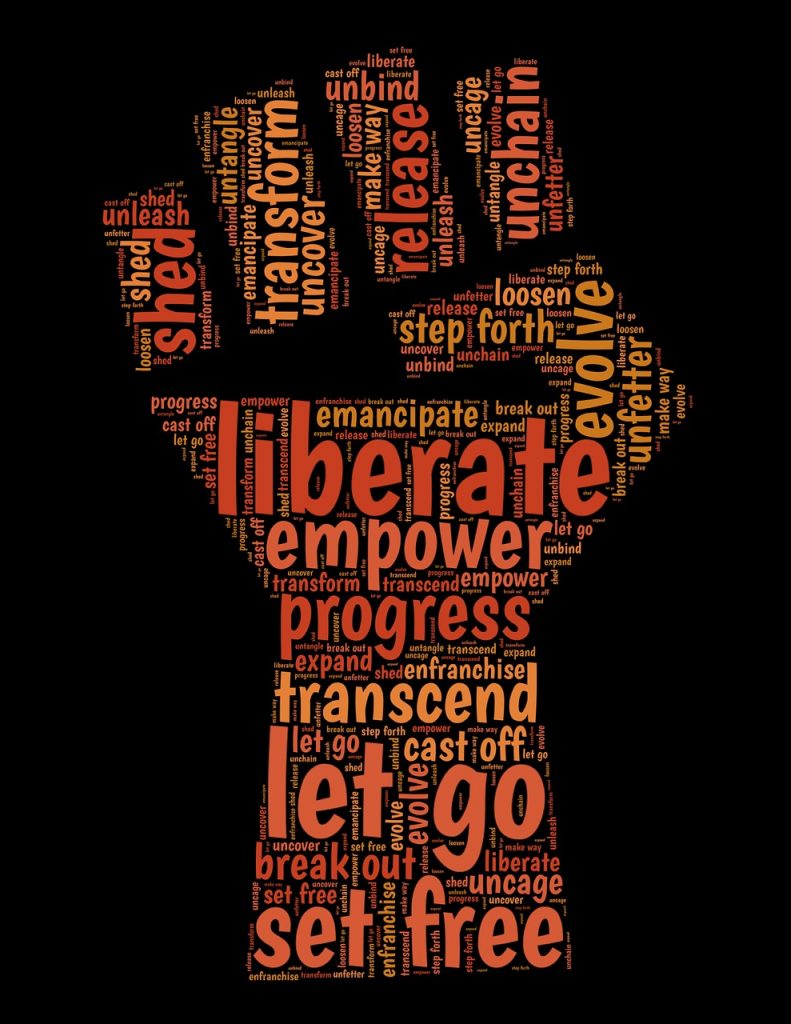(Continued from Part I..) My smallness was further exacerbated by my perception of my husband as I believed that he didn’t “get me” or stand up enough for me. He didn’t understand. And although he never directly said this, I felt that he started to worry about what I might say when out at dinner with his family or friends—in case they said some “well-meaning” uninformed or racist shit that only I, identified as racially ignorant—and I felt inclined to call out the BS. This further diminished my confidence. I had no one. Even the man I married could not see me. So naturally, I started to resent him.
He would later tell me, that he began to see Norway through my eyes. It was not the paradise free of discrimination, bias, and racism. It was not a land overflowing with milk and honey and opportunities for all! This realization pained him. And for a while, he tried to defend it. To make excuses for it. But he could not do so any longer. Because he saw how it affected me. How it changed me. How it forced me to become a ghost of my former self.
In hindsight and in assessing the other side of the coin, I was so overcooked by my righteous depression and resentment that I stopped seeing my husband. I felt entitled to his service. He owed it to me. I never said thank you. I just expected him to show up and do everything. And he did. He is the primary reason why I started my own company. He strongly encouraged it. And because I bootstrapped, he would learn new skills to help me startup. On days when I couldn’t get out of bed, and there were many, he would wake up hours before he had to go to a job he hated, ransack the internet looking for events I could attend and sign me up for them. He would make breakfast and lunch, so I had something to eat. While at work, he would check in with me every hour or so. He’d send loving and encouraging texts, and call me during his lunch break. And when he came back from work, he would make dinner. And then continue working on whatever task I had demanded of him for my company. He would stay up late after I had gone to bed, hacking at his laptop to complete a task I had assigned. I would get upset if it was not being done fast enough and if it was not completed when I needed it to be. This went on for months. He hardly ever complained. He put up with me. He fought for me, even though I was too blinded by my pain, to see it. And I never said thank you. I was neither a partner, a friend, nor a wife. Writing this is as chilling as it is humbling. I was lucky to have him and he deserved better than I gave at the time. I was a spoiled entitled grown-up brat!
Luckily, I did something right. Although in a fog, I was clear enough to see that I loved my husband more than I resented him. So, I couldn’t leave him (and thank God he didn’t leave me either!). And in the natural order of things, I started to resent Norway. Not the people, just the country. The weather, fish (which I love), and everything else in between. You couldn’t say one positive thing about Norway without a “but” from me. In the process of resenting Norway and what I felt it had done to me, I started to speak up again and take up space at family dinners and in public. I was no longer going to be invisible. I started to defend my sanity even if it meant being referred to as the “crazy” or feisty one. I attended professional events and would challenge unconscious biases of speakers. The first time I spoke up at a professional Norwegian breakfast seminar, my voice broke, my heart raced and my mouth dried up. But slowly, I started to find my voice again. I could look at myself in the mirror and see remnants of who I used to be. And the more I became the person I recognized, the less angry I became. I read no bullshit self-help books—not the kind that tells you that the sun shines on your bottom because it should—but the types that spoke to me in the type of harsh words that I understood. And slowly I willed myself off the bungee rope. My feet touched the earth and I began to find my center.
“Nothing happens until something moves.” –Albert Einstein.
This above quote has seen me through every difficulty I have ever faced in my life. It may mean something different to each person but to me it means that for change to happen in my life, something has to move. In my life experience, what often has to first move are my thoughts. In this case, I had to change the way I thought of and looked at things in Norway. And as I began to do so, the things I started to look for changed. So, I made a long note. I’ll share three of them.

First. I would no longer depend on securing my first work contract in Norway. They couldn’t afford me anyways! I would go abroad. I packed my bags for a few weeks, with my husband in tow, and travelled to one of the countries where I had a network. On our third day there, I secured my first paying project from a medium sized oil and gas company. The amount they offered to pay me was incredible and exactly what I was worth, yet somehow, my time in Norway had made me forget that I was worth that much. This company even asked me to “manage” the value they offered. Of course, I told them I would “manage” it because I wanted them to become a return customer, but I was doing back flips of joy on the inside.
On this day, my confidence in my skills and capabilities returned. Who cares if no other company in Norway could see it! I am not entitled to their recognition and approval of my skills. Likewise, they are not entitled to me belittling myself and minimizing my worth to fit their expectations of me.
Second. Go out and find like-minded people. I am not special. I cannot be the only one in this country with this experience. So, I went out and sought friendship with people. Mainly foreign people. I would literally ask people I met if they would fancy a coffee and then set up a coffee date on the spot. I didn’t care if they thought I was crazy. I was desperate. I needed to change my life. Something had to move! It was easy to connect and become close. Each likeminded Norwegian or foreign person living in Norway that I met were fighting their own battles—of fitting in, integrating in their or a new country, raising a child, dealing with Barnevern or finding a job—but we were united in our struggles. And also, of our previous experiences accumulated elsewhere. Not all of these people I met became great or lifelong friends but I have fond memories of them. They brought some sunshine into my life, when I mainly had clouds. And for this, I will always be grateful.
Third. Norway is Norway. Find and make your own way. It may not enable you, but it will certainly not get in your way. I like to think of Norway as biological adaptation. Adapt to survive or die. I once had the opportunity to speak with an inspiring woman who works to improve the life of immigrant people in Norway. She smiled when I told her of my experience and feelings. She said she felt the same way 30 years ago when she arrived. Nothing had seemingly changed.
But things are getting better. I choose to wholeheartedly believe this. And in my own way, I am contributing to the betterment. Norway is a small country where change takes time (this is not an excuse and it does not make it forgivable either. It is just a fact). Especially on issues affecting a minority group (insert whatever minority group you fit into) and this is not primarily a race or gender minority. I find myself a minority for being an unapologetically opinionated and outspoken woman, and yes even in Norway, the land of female liberation!
In many ways, Norway is also an incredibly liberating country. You have access to social freedoms and rights that puts other leading developed and Western countries to shame. Norway is not all that bad. I still do not agree that it is the happiest country in the world (according to that widely publicized article a few years ago) but it is certainly a far cry from even being a bad country, never mind the worse country to live in. I have learned to love the weather (well the winter is still up for discussion), what I mean to say is that I now appreciate even ten minutes of sun or even something like a ray.
Norway has thought me to be patient—very patient—although I am yet to perfect this virtue ;). I have survived a difficult time of mind-fuckery with my partner and it did not break us. It actually made us stronger.
These days, when he wakes up early to catch up on his own work, and prepare to go to a job he likes, whilst making sure I have hot-water-lemon (the first thing I like to have in the morning) on my bed side table, I am often half awake. I am always overcome with joy. I have a kind and loving man all to myself (credit and thanks to my spectacular mother-in-law :-)). He still does not always ‘get it’. On some days, I am still impatient with him. But I see him. He sees me. I appreciate him. I always say thank you. He loves me. And I love him too. The rest will take care of itself.
I have only recently survived a blow to the head (thanks to Norwegian winter and slippery ice) that had me losing my mind, and acting batshit crazy for some weeks. And yet, I stand. I have lost friends and gained new ones. I have less stress in my life. I have better priorities and they evolve each day. My professional life is thriving and my business is expanding. I am still a work in progress and I continue to evolve and learn and accept new things about myself and Norway. More importantly, I have learned to speak up again, I cherish it more, the second time around, and I do it consciously and with intention. I have become even more comfortable with saying “No” unapologetically, and likewise, to be okay with hearing “No”. I have learned to pick my battles and to accept that I cannot always have it all. I practice gratitude daily. I sometimes have difficult days, or get upset by something, but I’m looking at every challenge differently now and without entitlement. In many ways, Norway has made me stronger and continues to be a teacher—by fire and by force.
Lessons Learned:
- Mental health is a daily and ongoing endeavor that should never be taken lightly. It should be worked on and protected, by fire, every day.
- Entitlement is a disease. It breeds misplaced disappointment, resentment, failure and serious anger issues.
- Norway does not owe me a thing! It didn’t beg me to come, it won’t miss me if I left.
- My life did not start in Norway. It will not end here. I walked into an unpaved forest and crafted a path for myself. Norway did not do this for me. I did it by and for myself (and of course with help of my cheerleading and supportive husband, family and friends).
- I have an unmatched upbringing. A world recognized education. A global network and access to opportunities in many countries across the world. I can leave Norway anytime I want. I have privilege in many spectrums across social, economic and political lines. I have privilege. I married the best man for me, and I have the most amazing people in my life—in Norway and abroad, who would show up, if I asked, without question. There are people who have it way worse. I need to be grateful, always.
Written by E.





This is what I call “Actionable” information; news you can use if a highly educated and experienced professional is flirting with the idea of migrating to another country and culture due to Love. I too share similar attributes, characteristic traits, global experiences, and professionalism as you. I too migrated to Norway due to am adamant request by my wife upon my official retirement out the US Army, 27 years of service, 3 combat tours, and 1 UN Peacekeeping assignment. I always felt that the seemingly unknown psychological impacts (unique depression) were attributed by my tough integration and career search had… Read more »
Hello Derrick, First, thank you for your service. Second, thanks for taking the time to read and provide such a thoughtful comment to my post. It is reassuring to meet others who have also had similar experiences and are thriving. You seem to have had an interesting career and life experience and I am certain there’s plenty I can learn from you. I very much enjoyed reading both your articles on LinkedIn (thanks for sharing by the way!). I see that you have successfully started a new chapter for yourself here in Norway, and your drive and determination is inspiring.… Read more »
This is so me now. I literally feel every single word you wrote. Norway is giving me really hard time but this words are showing me that I’m not alone; it’s not easy to be foreginer in Norway.
Thank you for sharing your experience.
N
Hi Nina, I am very sorry to hear that you are going through a difficult time in Norway at the moment. It is not easy being a foreigner here, but you are certainly not alone. If you are in the Oslo area, I’ll be happy to meet you for a coffee if you feel up to it, or we can have a phone call or Skype chat. And of course, my wish for you is that it gets better for you. Hang in there!
This was a truly wonderful read. I would have coffee with you in a heartbeat! Best, Ina
Oh, this article came to me at just the right moment. I moved to Norway for my now Norwegian husband 6 months ago, leaving 2 very good jobs, a social network and hobbies I loved that I had managed to create and set in another country we had moved in together and after some struggle I went through there as a newcomer with zero networks, contacts, job proposals, etc for a promise of a ‘better land with opportunities for our future family’ etc. Also, I left my country with a job and my own home (no mortgage no rent no… Read more »
Hi Anastasia, thank you for your comment and for sharing. No need to apologise, I am happy to read from you. I am sorry to hear that things have been difficult for you here in Norway. The processes in Norway can be tedious, thus making it extremely painful for newcomers. I know from personal experience that there is no easy way out of it and most times it seems like it never ends. I can’t even begin to imagine the additional layers of stress these all brings forth with your pregnancy, and not being able to access healthcare at this… Read more »
I would love to meet you in Skype E. 🙂 Thank you so much for your heart-warming words!
I wonder how are you now Anastasia? It has been three years and as a pregnant mother, your comment was very worrying. Please inform us.
What a wonderful read. Thank you. I just moved to Oslo for my wife, who is awesome. On Friday, I put in my full application for a temporary visa. It’s good to see people, such as yourself, delivering cogent remarks on what I might expect in the future from my experience here. I’m from Wisconsin, originally, so the winter is… well… a bit of a joke, really. It’s warmer here in the winter, though Wisconsin does better on removing snow and ice from sidewalks. So, at least I don’t have that to worry about. As I’m still in the application… Read more »
Thank you Joshua for your comment and input! I am glad you found my blog useful. I am sorry to hear that you have experienced hostility from some Americans you have come across. That’s both disheartening and unpleasant. And yes, I agree. There’s something quite exclusionary about the term expat. I will say that for me, moving to Norway because of my husband kind of left me undecided as to how to define myself/immigration status. I wasn’t quite an immigrant, I wasn’t quite an expat, so I decided to call myself a ‘love-migrant’ instead :). Good luck with your visa… Read more »
I just moved to Oslo and am really struggling. These posts about your experience with depression in Norway resonated with me a lot. Thank you. Wish our paths to cross sometime. I might start inviting random people to have coffee, too.
Thanks Kristina. While I am happy to hear that you found my blog useful, I am also sorry to hear that you are struggling. It does get better though, and I hope it gets better for you sooner than later. I’ll be happy to have a coffee with you whenever you feel up to it :). Just reach out via . Wishing you a good week ahead!
Hi, it’s a good write and I’m sorry to hear you went through this. Still I wouldn’t come to the same ‘lessons’. I have gone through similar experiences, after also having lived in different countries and continents. My conclusion was to leave after 3 years, not to stay. Of course it’s not impossible to put up with it, but it’s just not pleasant, nor nice, nor am I willing to sacrifice that much just to adapt. Because no matter how hard you try, In some ways you will take over some Norwegian traits by staying here long. I have seen… Read more »
Hello Wendy, thank you for reading and your input :). Sorry to hear that you have gone through similar experiences. And I assume you are better off for having left, and that is happy news. Of course, on a few days, I still wonder why I stay, but on most days, I stay for my husband and for the community of amazing friends (and unsurprisingly, a majority of them are also not Norwegian) I have accumulated here. However, this does not mean that Norway is where I will remain for the rest of my life, but for now, I am… Read more »
Thank you for your kind reply:) You are right, there may be circumstances in which you chose to stay, and there might come a time when you find a better place. Finding friends with similar experiences is for sure the best way to keep close to your values and to enjoy living in Norway. I wish you all the best!
Hi loved you essay. I replayed on the first part. You are saying here you dont know if you will stay here. I feel like I am just wasting time until I can run away. The bad part is that I won’t get back that time. So I don’t know what else to spect in Norway just a quiet easy going boring life. I am 36 I feel like an old person here not willing to leave the sofa.
This is a wonderful essay. I am so sorry you had such a negative settling in experience in Norway. I moved here in January and my situation apart from banking and other tedious life admin complications, has thankfully been smooth-sailing. But my brown-skinned, afro-haired Latina partner has had a similar experience to you, unfortunately. She is working now and handling it better but I feel if I told her we were going home tomorrow, she’d be happy. Like a little dog in the back of the car with his face out the window. She overcame the loneliness by finding like-minded… Read more »
Hello Catriona, thank you for reading and your comments/inputs. Happy to hear that you have had a relatively ‘easier’ experience here in Norway. I am sorry to hear about your partner’s experience, but also glad that she is doing better and have met open minded people who include her. It is also quite refreshing to hear that you remain your authentic Irish self 🙂 – please never change! And thank you for your encouraging words, it means a lot – maybe one day, I’ll write a book :). If you and/or your partner are up for a coffee some day,… Read more »
Some parts of this had me bowling my eyes out because I could relate to SO much of it. I have been an excellent drama and literature student all my life and theatre and writing has been my lifelong passion. I even got very high grades in those two subjects, but once I came to Norway due to my mother’s health, I had to deal with so many misconceptions of “people of my kind”. I once had a teacher astonished only because I recognised a “tutu”, (the skirt ballerinas use) and knew what it was called. This other teacher was… Read more »
Wow Wow My Heroine💪💪💪💪💪
Hi E. Thank you for a really insightful article. I am currently in South Africa and in a long distance relationship with a Norwegian man living in Hamar. We are currently discussing the possibility of me moving to Hamar and making it our permanent residence . My main concerns similar to what you expressed in the article is the challenges of integrating into Norwegian way of life being a person of colour (minority) and the potential prejudices and biases one may encounter (apart from the weather difference acompared to the consistent beautiful temperate weather we have here in sunny South… Read more »
Hello, This is such a great piece and I’m happy I came across it! I just moved to Norway to join my husband, both of us are from West Africa and everything you describe is real.. I have not been able to secure a job here yet despite my experience but my husband has a great job he likes. It really gets depressing and I wonder how our children will be if we bring them up here. Being West Africans we’re naturally fun loving, outgoing and we love company but that seems to be luxury here. And I noticed people… Read more »
Thank you for writing this E.! I could see myself through this. It’s not been an easy and kind journey for most of us, feel assured I am not alone.
Hi, I recognize many things you wrote. After 7 years, I still don’t like Norway.
My Norwegian family doesn’t understand. They laugh and say that this is Norway. I would like to have a coffee with you if you still live in Oslo/Bærum.